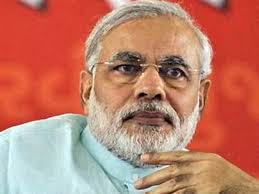
Addressing a massive "Karyakarta Mahakumbh" (party workers' mega conclave) here, Modi, who is the Bharatiya Janata Party's prime ministerial candidate, took repeated digs at the Congress and called upon party workers to rid the country of the party that heads the coalition central government.
He said that "a Congress-free India" will fulfil "Mahatma Gandhi's desire of disbanding the Congress".
The BJP sought to put up a show of unity at the rally in the poll-bound state with party veteran L.K. Advani sharing dais with Modi for the first time after the latter was named as the party's prime ministerial candidate.
Advani had not attended a party meeting earlier this month that selected Modi as the BJP face in the 2014 general elections.
A galaxy of BJP leaders attended the Bhopal rally.
Modi, who was the main speaker at the rally, referred to the Congress-led United Progressive Alliance government as "sultanate" and "Delhi ke shahanshah (rulers of Delhi)" in his nearly 35 minute speech.
Attacking the Congress, Modi said the party was not going to put up candidates in the assembly elections in Madhya Pradesh, Delhi, Chhattisgarh, Rajasthan and in the general elections and the CBI would fight the elections on its behalf.
"The Congress is not going to put up its candidates. It is not the Congress but the CBI which will fight the polls. The Congress does not have the capacity to fight the BJP. They have fielded the CBI. It (Congress) should hear clearly how it had been paid back by people for the atrocities of the emergency," he said.
Former prime minister Indira Gandhi had imposed a state of emergency in 1975 that lasted 18 months during which political opponents were jailed, civil liberties curtailed and press censored.
The BJP has often accused the Congress of misusing the CBI for its political ends.
Modi's close aide and former Gujarat minister Amit Shah is expected to be quizzed by the CBI in the Ishrat Jahan alleged staged shootout case.
The Modi government has been facing the heat over alleged stage shootouts in the state with suspended police officer D.G. Vanzara alleging in a letter that the chief minister and Shah were also to blame for the incidents.
The workers conclave was organised on the birth anniversary of party ideologue Pandit Deendayal Upadhyay and seen as a show of strength by the Shivraj Singh Chouhan government in Madhya Pradesh. The BJP is seeking a third successive term in the assembly elections to be held later this year.
Modi heaped lavish praise on Chouhan and said the chief minister deserved the maximum credit for "forcing" the Congress to talk of inclusive growth.
Attacking the Congress over corruption, he said if "numeral one is put in Bhopal, the number of zeros (for the money involved in graft) will go upto Janpath (the Delhi road which has the residence of Congress president Sonia Gandhi".
He said people should think of their future generation while casting their vote.
"You have faced difficulties but do you want your children to be forced to live in poverty and illiteracy...," he said.
He said all surveys were in favour of the BJP. "People say there is a storm in favour of the BJP from Kashmir to Kanyakumari. We also feel good listening to this," Modi said.
Modi said it was the duty of party workers to translate the wave of support into votes.
He said the Congress-led central government had stopped bringing out a progress report on the 20-point programme as the BJP or National Democratic Alliance-ruled states had been among the top five performers for the past several years.
Modi alleged the Congress government in Madhya Pradesh led by former chief minister Digvijay Singh had "destroyed" the state.
"Today Madhya Pradesh is ready for a leap. The Congress is hungry for the last 10 years. If a mistake is made (Congress comes to power), you can imagine how things will take a turn for the bad," Modi said.
He accused the UPA government ofdiscriminating with the BJP government in Madhya Pradesh.
Chouhan slammed the Congress for corruption. "A stands for Adarsh scam...Z for zamin (land) scam," he said.
BJP president Rajnath Singh accused the Congress of resorting to lies to drag the name of the Rashtriya Swayamsevak Sangh, the ideological fountainhead of BJP, in a blasts case in Jaipur.
The rally was also attended by BJP leaders Sushma Swaraj, Arun Jaitley and Uma Bharti.





Comments
Add new comment